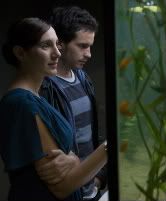 Despite their own life challenges, everyone is laughing and smiling — everyone but Andrés. They quiet down and ask him seriously, “Have you seen her yet?”
Despite their own life challenges, everyone is laughing and smiling — everyone but Andrés. They quiet down and ask him seriously, “Have you seen her yet?”
Andrés is back. He’s got the charm, the boyish looks, the fame and the charisma that make him irresistible. After 10 years he returns to Santiago, Chile and the house of his childhood memories.
He wanders through the big old house room by room. His friends ask him to go out to a party. A troubled young girl, who has memories of Andrés from when she was around 10, propositions him.
A pregnant but lonely old friend asks if he’ll sleep with her while her husband lives it up in the next room. He declines. His charisma is intact, but his downcast eyes and slumped posture reveal that he is not happy.
Andrés has been working as a famous international travel writer based in Berlin. Two young boys, sons of his old friends, ask him explicit questions about his worldwide encounters with women. He is candid but perfunctory. Through the interview we understand that Andrés has led a life of substantial experience but without commitment, responsibility or love.
As he travels the house he keeps telling everyone, “I’m just leaving.”
So why is he still there?
Is he searching for his identity? His integrity? A reunification with who he was? Or is he just experiencing a nostalgic reverie of his past? Soon we know.
Matías Bize, who co-wrote this screenplay with Julio Rojas, is a sensitive, insightful director. He is a master at using silence with subtle facial expressions to unveil a story. When Andrés enters the room where his old girlfriend, Beatriz, is listening to someone play music, we know it before we see her.
The air changes and the magnetic pull statics the hair on your arms. This is it. The dark, rich, warm lighting with feminine circles of unity play off shadows and emotions. After waiting for years without hearing from him, the object of his obsession, has married and had twins. But it is Andrés that she still loves.
Can he recapture what he’s lost? Is he strong enough to accept the responsibility of taking her and her children away to Berlin? What is he willing to give up to be with the one he loves? What is she?
Beatriz, a demure Mona Lisa, is all that is his home, all that is good and all that is holy. In Catholicism Saint Beatrice (Beatriz in Spanish) da Silva Meneses, is the patron saint of prisoners – a fitting analogy as Andrés finds himself sealed up in a pretty prison of shallow depth and meaning – a dungeon of his own creation.
Bize frames Andrés and Beatriz in the glass of an aquarium – as if they were fish caught in inescapable circumstances. But these small little fish who dart around without obvious purpose, also don’t love.
In the context of our environment, how free are we? What about the roles of responsibility and integrity? What constitutes the walls of our own confinement? And what about love — is life worth living without it?
This film provides intriguing questions for discussion and self-examination. This is the kind of film that adds dimension and richness to thinking — and perhaps entices you to become a Portland International Film Festival devotee.

“The Life of Fish” was featured
at the 35th Annual Portland International Film Festival.
Film Credits
Producers: Beverly Klara, David Matous and Adrián Solar
Director: Matias Bize
Writers: Julio Rojas and Matias Bize
Stars: Santiago Cabrera, Blanca Lewin and Victor Montero
Country: Chile | France
Language: Spanish with English subtitles
Release Date: June 10, 2010 (Chile)
Also Known As: “La Vida de los Peces”
Filming Location: Santiago, Chile
Awards: Goya (Spain) Award for Best Film and Chile’s nomination for Best Foreign Language Film Oscar
Website: http://www.lavidadelospeces.cl/_The_life_of_fish_.html
. . .
Follow Bev Questad on Twitter at http://twitter.com/questad.
And don’t forget to “Like” It’s Just Movies on Facebook at
http://www.facebook.com/itsjustmovies.